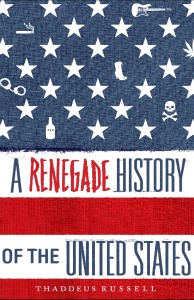 I previously reviewed the book “A Renegade History of the United States,” by Thaddeus Russell, who teaches history and American studies at Occidental College. It gives an alternative, sometimes politically-incorrect, view of our history.
I previously reviewed the book “A Renegade History of the United States,” by Thaddeus Russell, who teaches history and American studies at Occidental College. It gives an alternative, sometimes politically-incorrect, view of our history.
He starts with colonial, pre-Revolution America. My image of early America revolves around the aristocrats with their fancy clothes, high morals, and impeccable manners. But Russell focuses on the far more numerous lower classes, which included hordes of immigrants fresh off ships from Europe, forced to do whatever they could to survive in the New World.
It was a free-wheeling place, with few rules, very much an early version of the Wild West. In those days, the mid-1700s, Pennsylvania was the West. Colonial America had laws, but not many. Likewise with morals. It’s not the early America we were taught.
According to Russell:
- 40% of pregnancies in the late 18th century New England were premarital.
- Alcohol flowed in abundance, among both men and women.
- Far more women chose not to marry than at any other time in our history.
- Men and women often married, and divorced, without anything “legal” from the government.
- Among the lower classes, people of all ethnicities–including blacks and whites–mixed socially and sexually. Taverns, like brothels, were not segregated, but had all kinds of people drinking, dancing, and sleeping together.
- One-third of the adult female population was not only unmarried, but living with nonrelatives.
- In early America, urban women worked in every imaginable profession. Russell says historians estimate that up to half of all shops in early American cities were owned by women (true of 40% of the taverns in Boston during the 1760s). Many such taverns doubled as brothels.
Russell points out that the upper classes barred their “respectable” women from frequenting taverns. But in those days, most women were from the lower classes, and didn’t concern themselves with being respectable.
If American society was ever characterized as “free,” this was it—a time with few rules, moral or otherwise. There was very little government to interfere in anyone’s life.
And then came the Revolution, the war for Freedom.
After the Revolution, the upper classes began passing laws to regulate, if not reform, the immorality they so despised in the lower classes. They didn’t like all the drinking. They didn’t approve of women working—it wasn’t their place. They felt uncomfortable with blacks and whites mixing it up. And they especially didn’t like illicit sex. And so, they began legislating their morality.
The first target was illicit sex. Arrests for prostitution increased dramatically. Prostitutes or simply promiscuous women were confined in asylums until they were deemed “respectable.” Anti-vice organization targeted gambling houses, brothels, dance halls, and lower-class taverns.
In some places, women who bore children out of wedlock were forced to turn them over to the state, which officially labeled them as “illegitimate.” Welfare for unmarried mothers was discontinued, replaced by asylums for illegitimate children.
New medical literature described certain types of sexual activity, even among spouses, as deviant. Women were told they were inherently non-sexual. It became unseemly for women to run businesses and work in a “man’s” job.
Divorce became more difficult, no longer a matter between spouses. Now the government began regulating divorce. An abused wife seeking divorce had to show how attentive, obedient, and sexually faithful she had been while being victimized. A husband was deemed okay, as long as he provided economic support.
People were arrested for interracial sex, which had flourished before the Revolution, according to Russell. Brothel owners were charged with race-mixing. Post-Revolution America became more racially intolerant (England, of course, banned slavery long before we did).
Most of the Founding Fathers felt we should restrict voting and public office to landowners.
The new country became a place of regulated morality, rife with laws. As compared to the free-wheeling, almost-anything-goes life under the British.
In the process, the Founding Fathers, these firebrands for liberty and the pursuit of happiness, actually inflicted less freedom on Americans. Which is, of course, very ironic. Fight a war for freedom, and then become less free.





